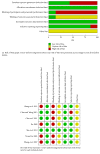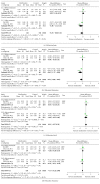Moxibustion for Diarrhea-Predominant Irritable Bowel Syndrome: A Systematic Review and Meta-Analysis of Randomized Controlled Trials
- PMID: 27293460
- PMCID: PMC4884811
- DOI: 10.1155/2016/5105108
Moxibustion for Diarrhea-Predominant Irritable Bowel Syndrome: A Systematic Review and Meta-Analysis of Randomized Controlled Trials
Abstract
Background. The complementary and alternative medicines in treatment of diarrhea-predominant irritable bowel syndrome (IBS-D) are controversial. Methods. We searched PubMed, Ovid Embase, Web of Science, Cochrane Library databases, CNKI, Wanfang Database, CBM, VIP, and AMED for randomized controlled trials (RCTs) of moxibustion compared with pharmacological medications in patients with IBS-D. A meta-analysis was performed using both fixed and random-effects models based on heterogeneity across studies. Results. In total, 568 patients in 7 randomized controlled trials were randomly treated with moxibustion and pharmacological medications. The improvement of global IBS-D symptoms and overall scores was significant (P = 0.0001 and P < 0.0001, resp.) in patients treated by moxibustion only compared to pharmacological medications. The specific IBS-D symptoms of abdominal pain, abdominal distension, abnormal stool, and defecation frequency were alleviated in patients treated by moxibustion compared to pharmacological medications, but no significance was found except for abdominal distension and defecation frequency (P = 0.03 and P = 0.02, resp.). There were no serious adverse events related to moxibustion. Conclusions. Moxibustion appears to be effective in treating IBS-D compared with pharmacological medications. However, further large, rigorously designed trials are warranted due to insufficient methodological rigor in the included trials.
Figures
Similar articles
-
Clinical evidence of acupuncture and moxibustion for irritable bowel syndrome: A systematic review and meta-analysis of randomized controlled trials.Front Public Health. 2022 Nov 24;10:1022145. doi: 10.3389/fpubh.2022.1022145. eCollection 2022. Front Public Health. 2022. PMID: 36589968 Free PMC article.
-
Effects of herb-partitioned moxibustion for diarrhoea-predominant irritable bowel syndrome: A protocol for systematic review and meta-analysis.Medicine (Baltimore). 2020 Aug 21;99(34):e21817. doi: 10.1097/MD.0000000000021817. Medicine (Baltimore). 2020. PMID: 32846822 Free PMC article.
-
External therapy of traditional Chinese medicine for treating irritable bowel syndrome with diarrhea: A systematic review and meta-analysis.Front Med (Lausanne). 2022 Aug 9;9:940328. doi: 10.3389/fmed.2022.940328. eCollection 2022. Front Med (Lausanne). 2022. PMID: 36017012 Free PMC article.
-
Comparison of electroacupuncture and moxibustion on brain-gut function in patients with diarrhea-predominant irritable bowel syndrome: A randomized controlled trial.Chin J Integr Med. 2015 Nov;21(11):855-65. doi: 10.1007/s11655-015-2049-x. Epub 2015 Apr 6. Chin J Integr Med. 2015. PMID: 25847778 Clinical Trial.
-
[Meta analysis of acupuncture and moxibustion for anxiety and depression in irritable bowel syndrome].Zhen Ci Yan Jiu. 2022 Sep 25;47(9):821-9. doi: 10.13702/j.1000-0607.20210808. Zhen Ci Yan Jiu. 2022. PMID: 36153458 Chinese.
Cited by
-
Effect of mild moxibustion on intestinal microbiota and NLRP6 inflammasome signaling in rats with post-inflammatory irritable bowel syndrome.World J Gastroenterol. 2019 Aug 28;25(32):4696-4714. doi: 10.3748/wjg.v25.i32.4696. World J Gastroenterol. 2019. PMID: 31528095 Free PMC article.
-
Efficacy and Safety of Acupoint Catgut Embedding for Diarrhea-Predominant Irritable Bowel Syndrome and Constipation-Predominant Irritable Bowel Syndrome: A Systematic Review and Meta-Analysis.Evid Based Complement Alternat Med. 2020 Nov 27;2020:5812320. doi: 10.1155/2020/5812320. eCollection 2020. Evid Based Complement Alternat Med. 2020. PMID: 33354220 Free PMC article. Review.
-
Efficacy and safety of moxibustion for patients with functional constipation: A protocol for systematic review and meta analysis.Medicine (Baltimore). 2020 Jul 10;99(28):e20910. doi: 10.1097/MD.0000000000020910. Medicine (Baltimore). 2020. PMID: 32664085 Free PMC article.
-
Irritable bowel syndrome and functional constipation management with integrative medicine: A systematic review.World J Clin Cases. 2019 Nov 6;7(21):3486-3504. doi: 10.12998/wjcc.v7.i21.3486. World J Clin Cases. 2019. PMID: 31750331 Free PMC article.
-
Non-pharmacological management of pediatric functional abdominal pain disorders: Current evidence and future perspectives.World J Clin Pediatr. 2022 Mar 9;11(2):105-119. doi: 10.5409/wjcp.v11.i2.105. eCollection 2022 Mar 9. World J Clin Pediatr. 2022. PMID: 35433299 Free PMC article. Review.
References
-
- Brandt L. J., Chey W. D., Foxx-Orenstein A. E., et al. An evidence-based position statement on the management of irritable bowel syndrome. American Journal of Gastroenterology. 2009;104(supplement 1):S1–S35. - PubMed
-
- Drossman D. A., Morris C. B., Schneck S., et al. International survey of patients with IBS: symptom features and their severity, health status, treatments, and risk taking to achieve clinical benefit. Journal of Clinical Gastroenterology. 2009;43(6):541–550. doi: 10.1097/mcg.0b013e318189a7f9. - DOI - PMC - PubMed
Publication types
LinkOut - more resources
Full Text Sources
Other Literature Sources
Medical





